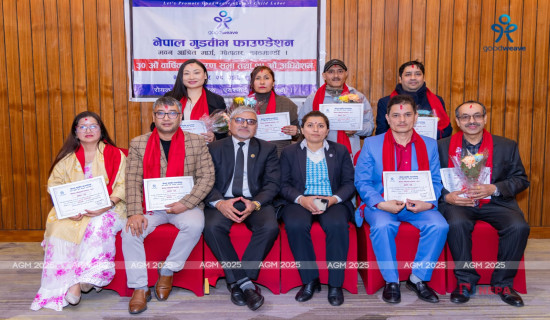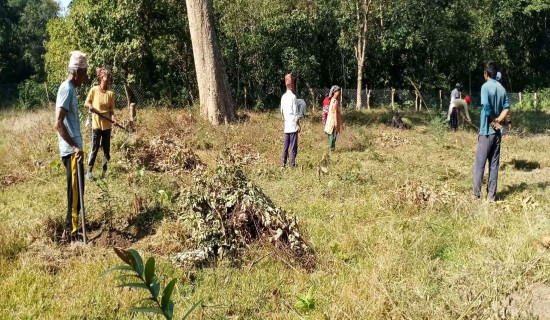- Saturday, 13 December 2025
Blossoming Business
Nepalis are making preparations to celebrate Tihar, known as the festival of lights and flowers, next week. The second biggest festival after the Dashain, Tihar is celebrated for five days. It is the sweet coincidence that flowers blossom and exude its natural aroma in the surrounding during the Tihar festival. Though flowers are the most essential part of Tihar, many people do not have their own garden to grow them to meet their demand during the festive seasons. So they have to buy flowers from the market. The flower entrepreneurs state that demand for flowers keeps rising by 10 per cent each year. During the festival, the flower demand soars and the domestic production cannot meet it, forcing the country to import them from different countries.
With the increase of domestic production, the import of flowers has gone down, however. Except for festival period, flowers produced inside the country fulfils around 90 per cent of demand. In order to meet the remaining 10 per cent, flowers have to be imported. During this Tihar, the domestic production is likely to fulfil only 60 per cent of flower demand and the rest 40 per cent will have to be imported, according to the Floriculture Association Nepal (FAN). An estimated 4.5 million flower garlands will be needed during this Tihar. Around 60 per cent of flower garlands are used in the Kathmandu Valley and the 40 per cent outside it. The festivals are not only a moment of joy, it is also a time to make economy vibrant. This is why it brings smile to the faces of farmers involved in floriculture.
As reported by this daily, locals of Gundu in Suryabinayak Municipality-7 of Bhaktapur, are now busy making the garlands of Makhamali (globe amaranth) flowers. Gundu is known for producing abundant Makhamali and Saypatri (marigold) flowers. Makhamali carries a special religious significance on the day of Bhai Tika. With the initiative of the local government, Makhamali flower has been commercially grown in Suryabinayak Municipality. There is an interesting story how Makhamali farming started in Gundu. Forty years ago, a local man Pahalman Nagarkoti began commercial cultivation of Makhamali flowers. However, his family members had to face various difficulties in cultivating it.
When they took the flowers to sell at Pashupati, Asan, Indrachowk and other areas of Kathmandu and Bhaktapur, the local traders forced them out of these places where the devotees thronged to buy the flowers. Late Nagarkoti convinced the local farmers about the economic prospects of Makhamali farming. Now many locals make a good income from floriculture. They are selling one Makhamali garland at Rs. 20 to 25. Flowers are grown in 50 hectares of land in Gundu that has road and transport facilities. More than 428 farmers have been involved in the floriculture after the municipality offered them grants through the Sana Kisan Agriculture Cooperative Ltd.
The Cooperative provides Makhamali and Marigold saplings at an 80 per cent subsidy, plastic for tunnel farming, tools, irrigation facility, seeds and hand tractors. Besides selling the flowers in the local market, the farmers have been supplying them in foreign countries, such as the United Arab Emirates, South Korea, Japan and the United States during the Tihar festival. Farmers begin to pluck flowers from mid-August and keep them in cold storage so that they look fresh till Tihar. Gundu sets an example that when there is institutional support for farmers, they can devote themselves in this occupation and earn a good living.

















